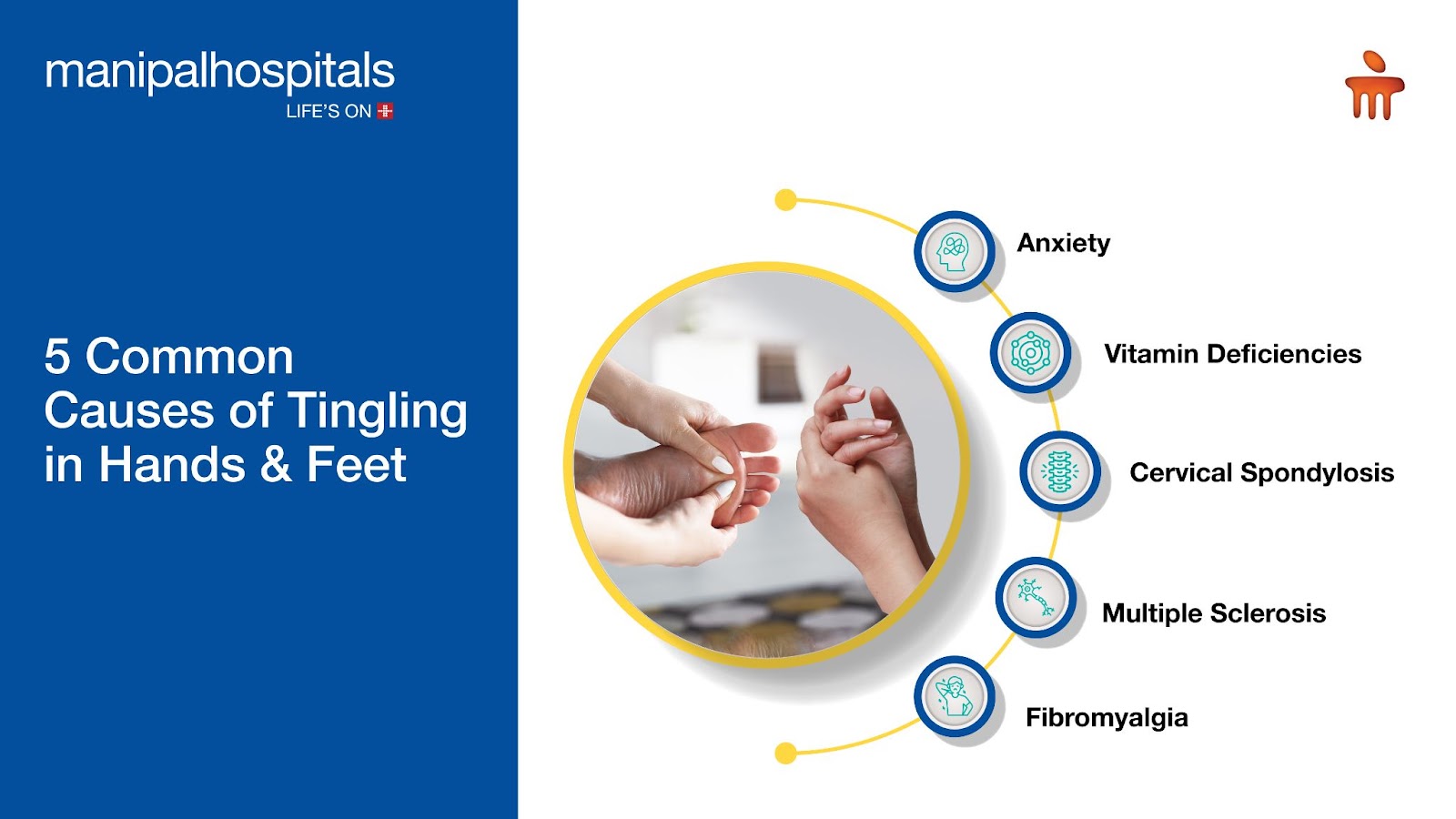
Do you ever experience a tingling sensation in your hands or feet? It might feel like pins and needles, numbness, or even a burning sensation. While occasional tingling might not be a cause for concern, persistent or recurrent tingling could indicate an underlying medical issue.
In this blog post, we'll delve into the common causes of tingling in hands and feet, and answer some frequently asked questions to help you better understand this sensation.
Synopsis
Causes of Tingling in Hands and Feet
Following the identification of potential causes for tingling sensations in the hands and feet, it's important to recognise the significance of seeking timely medical evaluation and intervention. Consulting with a healthcare professional enables accurate diagnosis and tailored treatment plans to address underlying conditions effectively. Early intervention not only alleviates discomfort but also mitigates the risk of potential complications associated with these conditions.

Additionally, adopting lifestyle modifications, such as maintaining a balanced diet, engaging in regular exercise, managing stress levels, and adhering to prescribed medications or therapies, can contribute to overall well-being, understanding numbness in hands and feet, and symptom management. Prioritising self-care and adhering to medical guidance are pivotal steps towards achieving optimal nerve health and enhancing quality of life.
1. Anxiety
Anxiety is a complex mental health condition characterised by feelings of worry, fear, or nervousness. Beyond its psychological aspects, anxiety can also manifest physical symptoms throughout the body and hence becomes one the main causes of the tingling effect that can be observed in hands and feet. This occurs due to the body's natural stress response, often referred to as the "fight or flight" response.
When a person experiences anxiety, the body releases stress hormones such as cortisol and adrenaline, which can lead to changes in circulation and nerve sensitivity. As a result, individuals may experience tingling or numbness in hands, along with other physical symptoms like rapid heartbeat, sweating, and shallow breathing which are common causes of a not-so-healthy heart. To know, please check Nurturing a Healthy Heart: Engaging Ways to Keep Your Heart Healthy.
2. Vitamin Deficiencies
Adequate intake of essential vitamins is crucial for maintaining overall health, including nerve function. Deficiencies in certain vitamins, particularly vitamins B12, B6, and B1 (thiamine), can lead to nerve damage and subsequent tingling sensations in the hands and feet. These vitamins play vital roles in nerve health, including the production of myelin, the protective coating around nerves.
Without sufficient levels of these vitamins, nerves may become damaged or dysfunctional, resulting in a condition known as peripheral neuropathy. In addition to tingling, symptoms of peripheral neuropathy can include numbness, weakness, and pain in the affected areas. Most vitamin deficiencies are observed in women, to know more please check nutrition recommended for women in their 20’s, 30’s and 40’s and 60’s onwards.
3. Cervical Spondylosis
Cervical spondylosis, also known as neck arthritis or cervical osteoarthritis, is a degenerative condition that affects the cervical spine (neck region). Over time, the discs and joints in the cervical spine may deteriorate, leading to bone spurs, herniated discs, or narrowing of the spinal canal. These structural changes can put pressure on the nerves that extend from the spinal cord to the arms and hands, resulting in tingling sensations. The tingling may radiate from the neck down the arms and into the hands, often accompanied by pain, stiffness, and reduced range of motion in the neck.
4. Multiple Sclerosis (MS)
Multiple Sclerosis is a chronic autoimmune disease that affects the central nervous system, including the brain and spinal cord. In MS, the immune system mistakenly attacks the myelin sheath, the protective covering of nerve fibres, leading to inflammation, scarring, and disrupted nerve signalling. As a result, individuals with MS may experience a wide range of neurological symptoms, including tingling or numbness in the hands and feet. These sensations, often referred to as "paresthesias," can vary in severity and duration, and may occur episodically or persistently over time. Alongside tingling, MS symptoms may include muscle weakness, coordination problems, vision disturbances, and fatigue.
5. Fibromyalgia
Fibromyalgia is a complex chronic pain disorder characterized by widespread musculoskeletal pain, fatigue, and heightened sensitivity to pain and other stimuli. While the exact cause of fibromyalgia remains unclear, researchers believe it involves abnormalities in pain processing within the central nervous system.
If you are experiencing symptoms of fibromyalgia or need advice on managing the condition, it’s important to consult with a healthcare professional. You can connect with a doctor online instantly to discuss your symptoms and get personalized recommendations for treatment and relief
Individuals with fibromyalgia often experience tingling or numbness in the hands and feet, along with other symptoms such as muscle stiffness, headaches, sleep disturbances, and cognitive difficulties (often referred to as "fibro fog"). The tingling sensations may be intermittent or constant and can vary in intensity from mild to severe. They may also be triggered or exacerbated by factors such as stress, weather changes, or physical activity.
Understanding the causes of tingling in hands and feet is the first step towards effectively managing this sensation. If you experience persistent or recurrent tingling, consult with a healthcare professional for proper evaluation and treatment. Taking proactive steps to address underlying conditions can help alleviate discomfort and improve your overall quality of life.
FAQ's
Yes, stress and anxiety can trigger physical symptoms such as tingling or numbness in hands due to the body's stress response, which can affect circulation and nerve function. However, it's essential to rule out other underlying medical conditions if tingling persists.
Peripheral Artery Disease (PAD) occurs when narrowed arteries reduce blood flow to the limbs, typically the legs. Reduced blood flow can lead to tingling, numbness, or pain in the feet, especially during physical activity.
Yes, diagnostic tests such as nerve conduction studies, electromyography (EMG), blood tests to check for vitamin deficiencies or thyroid function, imaging tests like MRI or CT scans, and nerve biopsies may be used to identify the underlying cause of tingling sensations.
Yes, certain medications, including chemotherapy drugs, anticonvulsants, antivirals, and antibiotics, can cause peripheral neuropathy and lead to tingling in hands and feet as a side effect.
While home remedies may provide temporary relief for numbness in hands, such as massaging the affected area, practising relaxation techniques, maintaining proper posture, and ensuring adequate hydration, it's crucial to address underlying medical conditions with the guidance of a healthcare professional for long-term management.






















 3 Min Read
3 Min Read











